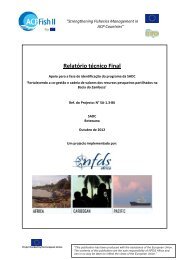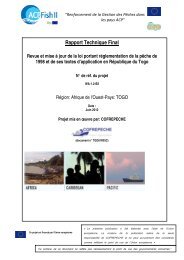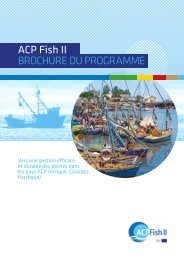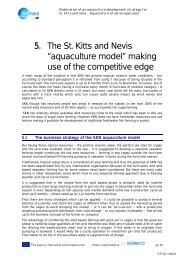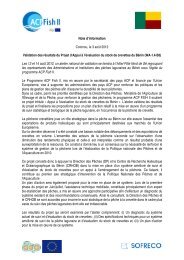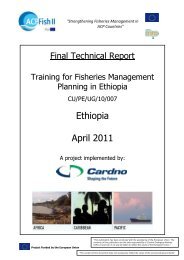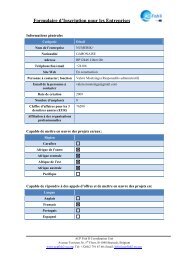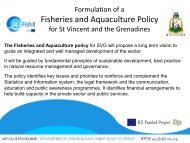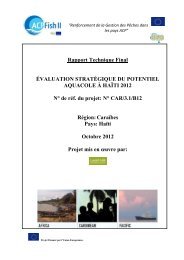Final Technical Report - ACP Fish II
Final Technical Report - ACP Fish II
Final Technical Report - ACP Fish II
You also want an ePaper? Increase the reach of your titles
YUMPU automatically turns print PDFs into web optimized ePapers that Google loves.
<strong>Final</strong> <strong>Report</strong>Megapesca Lda, Portugal14: How to be a trainer - communication and training techniques 34 3,85Friday 5th October15 and 16 Presentations by course participants 31 3,80The evaluation suggests that the course was highly relevant, and effective in communicating thetraining content. With the appropriate support and network, these participants now have thepotential to form a corps of trainers at community level, who can be mobilised in future to delivertraining to other processors and trainers.6.3 Supply of training materials for future training activitiesThe project has prepared two handbooks which contain training materials which cover the abovetopics. Approximately 50 copies of each were distributed during the course (as well as being issuedto participants, guests were presented with copies at opening and closing ceremonies). The balanceof 200 copies of each was presented to the Bureau of National <strong>Fish</strong>eries for use in future trainingactivities aimed at female fishery business operators. Trainers were also supplied with calculatorsand weighing scales which they can use in conjunction with the training handbooks.Trainers were also supplied with additional training notes for trainers which provide:Guidance on the use of the training handbooksTraining tipsSuggestions for practical work, worked examples etc.Pedagogical approach (good training and communication methods)This output is additional to the requirements set out in the terms of reference, but is considered to benecessary if sustainable training skills are to be imparted.6.4 Steps towards delivery of sustainable training servicesFrom discussions held with the participants and the BNF, it is clear that the future delivery oftraining at community level cannot be undertaken directly by the trainees in isolation, withoutadditional support. At the minimum, to ensure sustainable delivery of such training in futurerequires an organisation to support them, and finance to cover costs of delivery.Discussions therefore focused on the performance of the current apex organisation for the smallscale sector, the Liberian Artisanal <strong>Fish</strong>ermen’s Association, which supports fish processors andmarketers through its Women’s Branch. However, LAFA board has not met for over a year and itschairman is reportedly not undertaking his duties. Furthermore many coastal communities have notyet formed coherent groups with a committee structure. Some communities have formedcommittees (community based organisations) but until now, have specifically chosen not to affiliatethemselves with LAFA. One notable example is at Robertsport, which is the site of the proposedWARFP pilot investment in artisanal fishery centre. Here the Community Management Associationis opposed to membership of LAFA under its present constitution.The participants discussed whether LAFA as an apex body would be able to meet their needs. Theoption proposed was for the creation of a separate association, the Liberian <strong>Fish</strong> Processors andMarketers Association, which would at least allow for women operators in the sector to mobilisetheir collective resources without recourse to the moribund LAFA board.The participants were encouraged by the consultants to at least ensure that they maintained thenetwork established via the training course. To this end they exchanged mobile phone numbers,<strong>Technical</strong> assistance on Training of Groups of female fishmongers in good sanitary practices and management of small businesses 14



